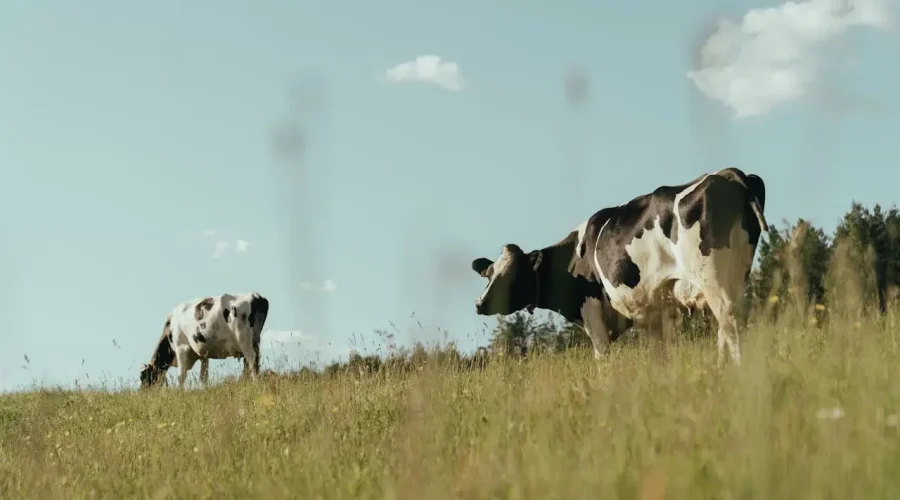How Animals Are Raised Organically in Ireland
When you buy organic meat, milk, or eggs in Ireland, you’re supporting a farming system that puts animal welfare, environmental care, and food quality first. Organic farming here is governed by EU organic regulations and implemented nationally through the Department of Agriculture, Food and the Marine. These rules are strict and detailed, covering everything from the type of feed animals eat to how they are housed, treated, and allowed to live.
Organic farming is more than “no chemicals.” It’s about creating a balanced system where animals thrive in conditions as close to their natural environment as possible, while the farm itself works in harmony with the land.
The Principles of Organic Animal Farming in Ireland
1. 100% Organic Feed
- All livestock must be fed a diet of certified organic feed, grown without synthetic fertilisers, pesticides, or genetically modified organisms (GMOs).
- Most organic farmers in Ireland aim to grow a large proportion of their animals’ feed on their own land, using crop rotation and natural soil fertility.
- Imported feed must be fully traceable and certified organic, with records kept for inspection.
- The use of artificial growth promoters or routine synthetic vitamins (when natural sources are available) is banned.
2. Natural Living Conditions
- Animals must be able to move freely and have enough space to behave naturally—whether that’s grazing, rooting, dust bathing, or socialising.
- Housing must be clean, well-lit, and well-ventilated, with comfortable bedding materials like straw or wood shavings.
- Confinement systems such as cages, battery units, farrowing crates, or tethering are not permitted.
- Stocking densities (the number of animals per area) are set low to avoid stress, injury, and disease spread.
3. Outdoor Access and Pasture Grazing
- Grazing animals like cattle, sheep, and goats must have access to pasture whenever weather and soil conditions allow, which in Ireland often means the majority of the year.
- Outdoor areas must provide shelter from harsh weather—trees, hedgerows, or purpose-built structures.
- Pigs and poultry also require outdoor runs where they can forage, scratch, or root around in natural ground cover.
- Rotational grazing is encouraged, not just for animal health but also to protect and regenerate grasslands.
4. Preventive Health Care
- Organic animal welfare focuses on prevention, not cure:
- Strong immunity through good nutrition and low-stress living.
- Clean housing and pasture rotation to reduce disease risk.
- Access to natural remedies (herbal treatments, homeopathy) where appropriate.
- Veterinary medicines, including antibiotics, are only used when absolutely necessary and never as routine disease prevention.
- If antibiotics are used, strict withdrawal periods apply before animal products can be sold.
5. Humane Treatment
- Handling must be calm and low-stress—shouting, hitting, or using electric prods is prohibited.
- Painful procedures, such as dehorning or castration, are avoided where possible and, if necessary, must be carried out under veterinary supervision with pain relief.
- Transport times must be kept as short as possible, with animals given space, ventilation, and water during journeys.
Certification and Inspections in Ireland
To sell animal products as “organic” in Ireland, a farm must go through a two-year conversion period:
- The farmer applies to an approved Irish organic certification body:
- An Organic System Plan is created, detailing housing, grazing areas, feed sources, breeding practices, and health management.
- Annual inspections are carried out, with the possibility of unannounced visits.
- Records are checked for feed sourcing, veterinary treatments, and animal numbers to ensure compliance.
If a farm fails to meet the rules, certification can be suspended or removed.
Examples from Irish Organic Farms
- Organic dairy farms: Cows graze on chemical-free pasture for most of the year, coming indoors in winter with access to comfortable straw-bedded sheds. Winter feed comes from silage or hay grown on the same farm.
- Organic sheep farms: Sheep roam freely across mixed pastures, with rotational grazing to allow fields to recover. Lambing sheds are clean, dry, and used only during harsh weather or for lambing assistance.
- Organic poultry farms: Chickens have large outdoor areas with grass, trees, and shelters. Inside, they live in roomy barns with natural light and deep bedding for scratching.
Why This Matters for Ireland
Better Animal Welfare
Organic animals live in conditions that allow them to express their natural behaviours, grazing, roaming, scratching, or dust bathing, without the stress of overcrowding.
Environmental Protection
By avoiding chemical fertilisers and pesticides, organic livestock farming protects water quality, soil health, and biodiversity in Ireland’s countryside.
Stronger Rural Communities
Buying organic supports small family farms, keeps money in local economies, and helps maintain Ireland’s traditional farming landscapes.
Healthier Food
Meat, milk, and eggs from organic farms come from animals fed a natural, chemical-free diet, with higher welfare and lower stress levels.
Your Role as a Consumer
Every time you choose organic meat, milk, or eggs, you support a system that:
- Respects animal welfare
- Protects the Irish environment
- Keeps rural farming communities alive
